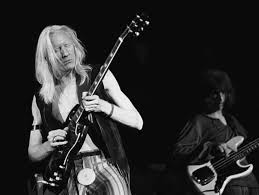 |
| blues (s)--Lori Bell , Ron Satterfield |
Lori Bell and Ron Satterfield
have spent the last few years wowing and beguiling audiences at large with
their vibrant combination of straight ahead, pop and boss nova inflected jazz. blue(s), their new album, is a welcome
release, an intoxicating blend of classic tunes by Miles Davis, Thelonious Monk
and Bill Evans among others, and three guileful originals by Bell .Flutist Bell
and guitarist /vocalist Satterfield are a musical combination that have the
shared reflexes of swift and nimble dancers negotiating difficult changes and
moving gracefully through a varied and rich field of tempos, moods, tones. Those of us lucky enough to witness their
magic live know the wonders Bell accomplishes during performance. Her improvisations
being a sublime compliment of speed and grace, with a skill to interpret
material, reshape melodies and play with the requirements of tricky and
shifting tempos. Her technique is meteoric,
but the sweetness of the music is never sacrificed in service to mere
virtuosity.
Bell’s genius for inventing
melodic conceptions in seamless succession fuses with Satterfield’s amazingly
adroit guitar work. Eschewing solos, he
instead switches between different comping requirements with ease, verve and style. He gleefully alternates between straight
up walking bass lines and shuffle patterns to the subdivided
syncopations of bossa nova, and shows the dulcet intuition of a pianist on more
somber material. (It’s worth a reminder
that Satterfield is a fine pianist as well with an agile and delicate touch, a
quality that informs a nearly flawless sense of rhythm and groove. There’s no lack of variety on Blue(S). Those requiring their music be
up-tempo and big league, Bell’s own “Bell’s Blues” begins the album with all
cylinders firing. It’s a hard swinging blues with some sweet criss-cross
changes with the flutist swooping and pirouetting over Satterfield’s propulsive
chords; Satterfield, at midpoint, eases into the fury with a lyric scat vocal,
mirroring Bell’s effervescent notes with his own vocalese. Satterfield’s voice
is one of the wonders of Southern California jazz.
The pair retook Monk’s “Blue
Monk” into a 6/8 time rush, the usually doleful melody transformed into a bit
of whistling, scat -happy whimsy.
Satterfield launches firmly from a beautifully clipped Latin groove and
propels the material with galloping chords, over which Bell decorates the
combustible pace with an airy, sprite set of improvisations, springing off
Satterfield’s able time keeping. The racing, call -and -response duet between
Bell’s flute and Satterfield’s bright vocal improvs are a wonder. Another high
point is a refreshingly sprite arrangement of Miles Davis’ classic “All
Blues”. With rare exceptions, later versions of the tune have treated Davis’s
original arrangement—slow, somber, casually yet firmly swaying as the trumpeter
outlines the spare, diminished theme and limns an n artful solo—as sacrosanct,
a steadfast version untouchable for the ages. Bell and Satterfield prefer to create anew,
not reenact an established idea, allowing them to mess with the songs mood,
elevating from its muted and brooding essence as a tone poem and turn that
swaying motion into something close to a swinging rhythm. Bell’s mastery is in full evidence, weaving
sprite, flutter tongued phrases over and between Satterfield’s brisk and agile
chord voicings. He sings again on this
tune, providing his own lyrics, at times matching Bell’s exuberance with his
own swift, non-verbal cadences. His voice is a perfect foil and counter point;
their harmonies are rich.
Blue(S) is a concept album, I suspect, indicated by the blue album
cover and with each song having the world “blue” in the title. More than a
blues album, this is a musical examination of the complex and nuanced emotional
states the word implies, a state of being that eludes final definition but which inspires composers and improvisers
to write and play music that brings our common humanity to the forefront. Aided
by a clean and clear production by Tripp Sprague, himself a fine Southern jazz
saxophonist, Lori Bell and Ron Satterfield essay through the
varieties of styles, moods and emotions the notion of “being blue” can
musically manifest itself. They’re able to address what those feelings in ways
mere words seldom can. blue(s) is a very fine work, a
collaboration of two jazz musicians at their peak.
(This originally appeared in the July, 2017 issue of the San Diego Troubadour. Used with kind permission).











